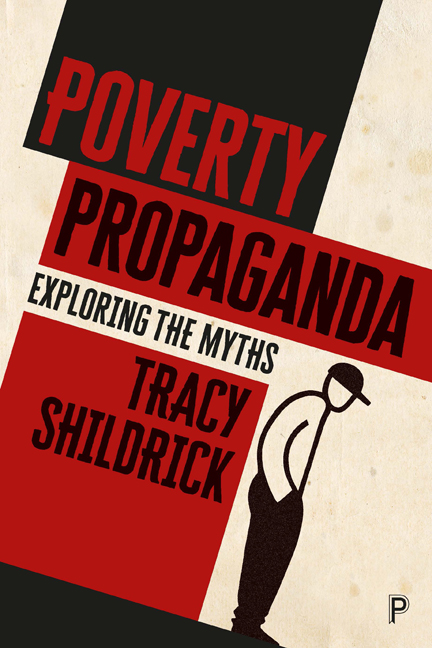Book contents
- Frontmatter
- Contents
- List of abbreviations
- Acknowledgements
- One Introduction
- Two Poverty propaganda
- Three Poverty and lived experiences
- Four Poverty, labour markets and ‘poor work’
- Five Poverty, social class and social immobility
- six Poverty: discrimination, stigma and shame
- Seven Poverty propaganda and reproduction of poverty, power and inequality
- Eight Conclusions
- References
- Index
six - Poverty: discrimination, stigma and shame
Published online by Cambridge University Press: 09 April 2022
- Frontmatter
- Contents
- List of abbreviations
- Acknowledgements
- One Introduction
- Two Poverty propaganda
- Three Poverty and lived experiences
- Four Poverty, labour markets and ‘poor work’
- Five Poverty, social class and social immobility
- six Poverty: discrimination, stigma and shame
- Seven Poverty propaganda and reproduction of poverty, power and inequality
- Eight Conclusions
- References
- Index
Summary
Introduction
Shame is taken to be externally imposed by society, via individuals and through social institutions, but internalized and experienced as a powerful negative emotion that results in social withdrawal and powerlessness. (Walker, 2014, p 2)
“They are making people feel like they are not up to scratch. Stop putting out that propaganda about scroungers. Stop trying to put fear into an already unsteady person. Stop trying to drive people by fear. You are a valuable piece of society.” (Amanda, aged 50, Teesside interviewee in Shildrick et al , 2012b)
“When I go to my constituency, in fact when I walk around, you can almost now tell somebody's background by their weight …//… Obviously not everyone who is overweight comes from deprived backgrounds, but that's where the propensity lies.” (Anna Soubry, MP, 2013)
This chapter develops the material in the previous chapter by looking at the concepts of stigma and shame. Central to understanding the issue of shame is the concept of ‘respectability’, which Skeggs (1997) powerfully argues is one of the most ‘ubiquitous signifiers of class’ (p 1) and which constitutes both a ‘marker and a burden of class’ (p 3). The ideas of shame and respectability have long been central to narratives about poverty and provided the foundation of notions about the ‘undeserving poor’, and they provide a really important mechanism that allows poverty propaganda to work. At one and the same time shame is both a cause and a consequence of poverty propaganda. People in poverty strongly buy into dominant narratives about the supposed feckless behaviour of people experiencing poverty – at least as applying to others – and this allows poverty propaganda to work to garner consent for policies that penalise, stigmatise and deepen poverty for those on low incomes (Shildrick and MacDonald, 2013).
Poverty: stigma and shame
That shame is associated with poverty is nothing new, but the increasing emphasis on conspicuous consumption and focus on individual responsibility, aspiration and achievement really throw this issue into sharp relief as it becomes ever more clear that poverty has not just material and physical effects but psychosocial ones too (Lister, 2004; Baumberg et al, 2012; Walker, 2014; Walker and Chase, 2015).
- Type
- Chapter
- Information
- Poverty PropagandaExploring the Myths, pp. 113 - 130Publisher: Bristol University PressPrint publication year: 2018



